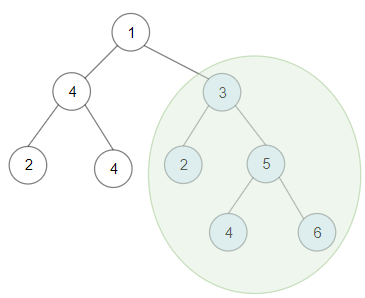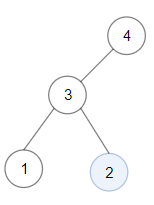原文链接: https://leetcode-cn.com/problems/maximum-sum-bst-in-binary-tree
英文原文
Given a binary tree root, return the maximum sum of all keys of any sub-tree which is also a Binary Search Tree (BST).
Assume a BST is defined as follows:
- The left subtree of a node contains only nodes with keys less than the node's key.
- The right subtree of a node contains only nodes with keys greater than the node's key.
- Both the left and right subtrees must also be binary search trees.
Example 1:

Input: root = [1,4,3,2,4,2,5,null,null,null,null,null,null,4,6] Output: 20 Explanation: Maximum sum in a valid Binary search tree is obtained in root node with key equal to 3.
Example 2:

Input: root = [4,3,null,1,2] Output: 2 Explanation: Maximum sum in a valid Binary search tree is obtained in a single root node with key equal to 2.
Example 3:
Input: root = [-4,-2,-5] Output: 0 Explanation: All values are negatives. Return an empty BST.
Example 4:
Input: root = [2,1,3] Output: 6
Example 5:
Input: root = [5,4,8,3,null,6,3] Output: 7
Constraints:
- The number of nodes in the tree is in the range
[1, 4 * 104]. -4 * 104 <= Node.val <= 4 * 104
中文题目
给你一棵以 root 为根的 二叉树 ,请你返回 任意 二叉搜索子树的最大键值和。
二叉搜索树的定义如下:
- 任意节点的左子树中的键值都 小于 此节点的键值。
- 任意节点的右子树中的键值都 大于 此节点的键值。
- 任意节点的左子树和右子树都是二叉搜索树。
示例 1:

输入:root = [1,4,3,2,4,2,5,null,null,null,null,null,null,4,6] 输出:20 解释:键值为 3 的子树是和最大的二叉搜索树。
示例 2:

输入:root = [4,3,null,1,2] 输出:2 解释:键值为 2 的单节点子树是和最大的二叉搜索树。
示例 3:
输入:root = [-4,-2,-5] 输出:0 解释:所有节点键值都为负数,和最大的二叉搜索树为空。
示例 4:
输入:root = [2,1,3] 输出:6
示例 5:
输入:root = [5,4,8,3,null,6,3] 输出:7
提示:
- 每棵树有
1到40000个节点。 - 每个节点的键值在
[-4 * 10^4 , 4 * 10^4]之间。
通过代码
高赞题解
解题思路
比赛时ac的解答是错误的,用例[9,4,10,null,null,6,11]错误,已发布的大多数题解都有这个问题。
多谢评论区978007503@qq.com指正。
当前节点为根的树是不是二叉搜索树和几个状态有关
- 左子树是不是二叉搜索树
- 右子树是不是二叉搜索树
- 当前val是不是大于左子树最大val
- 当前val是不是小于右子树最小val
我们确定root节点为根的树是不是二叉搜索树,需要其左右子树处理时返回四个值
- 子树是不是二叉搜索树 vec[0]
- 子树的最小值 vec[1]
- 子树的最大值 vec[2]
- 子树的sum值 vec[3]
根据左右子节点返回值,构造当前节点的返回
当左右子树的任一vec[0]为false,或者当前val <= 左子vec[2] 或者val >= 右子vec[1]时返回 {false,随意,随意,随意}
如果判断当前树是搜索树,则返回 {true, 左子v[1], 右子v[2], val + 左子v[3] + 右子v[3]}
另外注意的是null的处理,我这里返回了{true, INT_MAX, INT_MIN, 0}。
/**
* Definition for a binary tree node.
* struct TreeNode {
* int val;
* TreeNode *left;
* TreeNode *right;
* TreeNode(int x) : val(x), left(NULL), right(NULL) {}
* };
*/
class Solution {
public:
int maxsum = 0;
int maxSumBST(TreeNode* root) {
dfs(root);
return maxsum;
}
vector<int> dfs(TreeNode* root) {
if (!root) return {true, INT_MAX, INT_MIN, 0};
auto lArr = dfs(root->left);
auto rArr = dfs(root->right);
int sum = 0, curmax, curmin;
if (!lArr[0] || !rArr[0] || root->val >= rArr[1] || root->val <= lArr[2]) {
return {false, 0, 0, 0};
}
curmin = root->left ? lArr[1] : root->val;
curmax = root->right ? rArr[2] : root->val;
sum += (root->val + lArr[3] + rArr[3]);
maxsum = max(maxsum, sum);
return {true, curmin, curmax, sum};
}
};统计信息
| 通过次数 | 提交次数 | AC比率 |
|---|---|---|
| 8540 | 21057 | 40.6% |
提交历史
| 提交时间 | 提交结果 | 执行时间 | 内存消耗 | 语言 |
|---|




